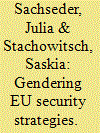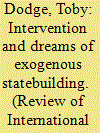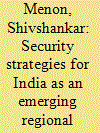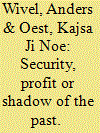|
|
|
Sort Order |
|
|
|
Items / Page
|
|
|
|
|
|
|
| Srl | Item |
| 1 |
ID:
193145


|
|
|
|
|
| Summary/Abstract |
This paper explores the relationship between the EU’s current re-imagining as a global security actor and its stance as a global promoter of progressive gender norms. For this purpose, we analyse how gender and race are constitutive of the meanings of security and Europe in major EU security strategies, and how this relates to the way gender (equality) is addressed as a policy issue. We find that, in the context of waning liberal world order and manifold internal and external crises, EU security actorness is constructed through narratives of masculinisation that entail feminisation of the EU’s own past as a “peace project” and “soft power”; Othering of non-EU spaces and subjects; colonial perspectives on the EU’s role in the world as “White Man’s burden” and the reconstruction of whiteness through notions of “neutral” masculinities associated with technocratic professionalism, superior knowledge production, and market rationality. This intersectional gendering of EU security limits the emancipatory potential of gender policy through the racialisation of Other women and the simultaneous invisibilisation of postcolonial structures of inequality. Our analysis provides the groundwork for addressing how and why the EUropean security project continues to reproduce intersectional power relations and insecurities, despite commitments to gender equality and non-discrimination.
|
|
|
|
|
|
|
|
|
|
|
|
|
|
|
|
| 2 |
ID:
124170


|
|
|
|
|
| Publication |
2013.
|
| Summary/Abstract |
The central thesis of this article is that when faced with state collapse, rising violence, and a complex stabilisation effort, the US, UN, and NATO in Afghanistan and the US and Britain in Iraq, deployed the dominant, if not only, international approach available, Liberal Peacebuilding. The article traces the rise of Liberal Peacebuilding across the 1990s. It argues that four units of analysis within neoliberal ideology, the individual, the market, the role of the state and democracy, played a key role within Liberal Peacebuilding, allowing it to identify problems and propose solutions to stabilise post-conflict societies. It was these four units of analysis that were taken from the Liberal Peacebuilding approach and applied in Afghanistan and Iraq. The application of a universal template to two very different countries led directly to the fierce but weak states that exist today.
|
|
|
|
|
|
|
|
|
|
|
|
|
|
|
|
| 3 |
ID:
164242


|
|
|
| 4 |
ID:
098882


|
|
|
|
|
| Publication |
2010.
|
| Summary/Abstract |
Which factors determine the security strategies of microstates? Many microstates are either secluded island states or have very close political, economic and cultural ties to a larger neighbouring 'protector state'. They have had, therefore, little use for more traditional alliance arrangements. However, the patterns of security cooperation between states have shifted as the significance of flexible ad-hoc coalition-building as a means to coordinate international interventions has increased. Consequently, the strategic security challenges and opportunities for microstates have been transformed. Focusing on the Operation Iraqi Freedom coalition, this article explores some of these challenges and opportunities. Three hypotheses regarding the decisions made by the respective microstates to join international ad-hoc coalitions are studied: (1) participation provides increased security, (2) participation provides economic gains, and (3) participation reflects the lessons of past security challenges. The explanatory powers of each hypothesis are examined using a comparative case study of 11 Pacific microstates.
|
|
|
|
|
|
|
|
|
|
|
|
|
|
|
|
| 5 |
ID:
104553


|
|
|
|
|
|
|
|